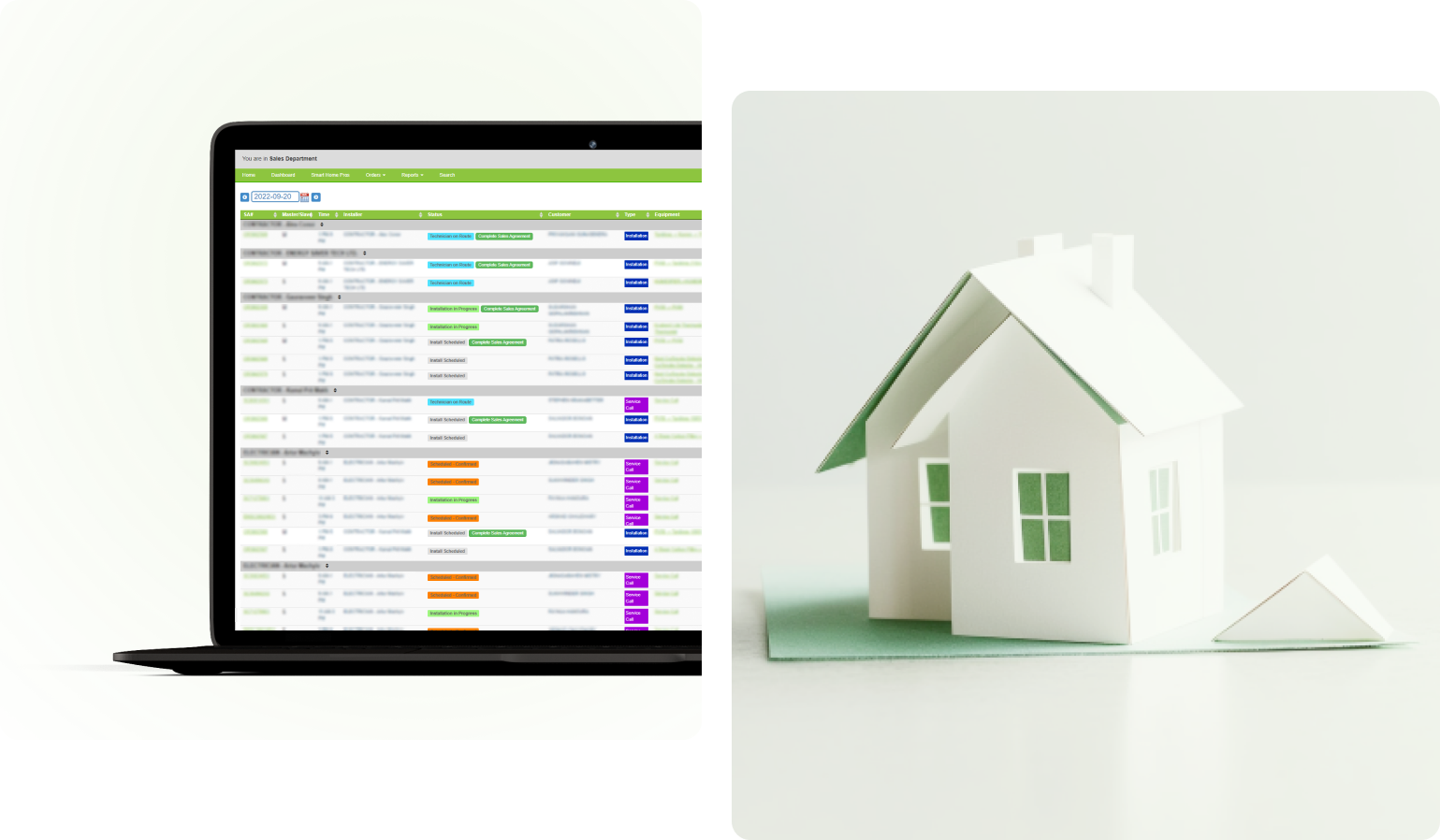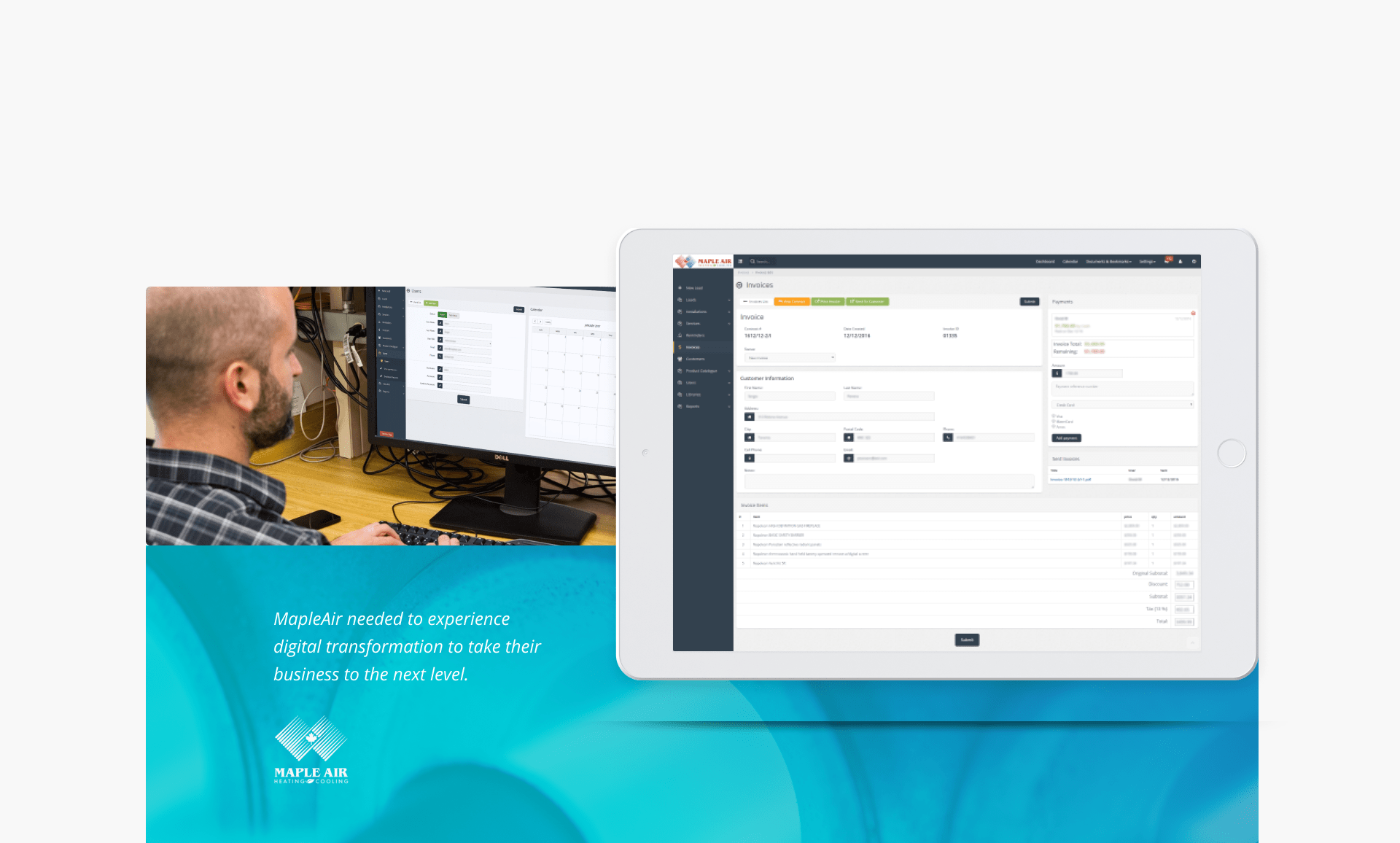
Digital transformation might seem like a meaningless buzzword that big companies throw around to impress customers. Really, all it means is using the latest technologies and trends in IT to get ahead in business — and it’s something that companies of all sizes can benefit from, including those in the HVAC space.
A custom CRM is a common example of digital transformation in the HVAC space. Even if it doesn’t seem like a big deal, designing a piece of software that’s tailor-made for your business can lead to massive improvements. You can:
- Close deals with new customers more quickly.
- Get a better handle on inventory in real-time.
- Keep closer tabs on open projects with less effort.
Why HVAC Companies Are Looking to Modernize Their Backend Operations.

That’s just a taste of what a custom CRM can do to digitally “transform” a company from behind the scenes. Let’s take a look at more reasons why HVAC companies are looking to modernize their backend operations with one:
1. Less Paperwork
How many hours do you and your team spend generating estimates, writing up work orders, and managing invoices? And how much time do you spend resolving issues caused by duplicate entries, input errors, and so on?
A lot of time goes to waste when you try to handle things manually. The same thing can happen when you use software that doesn’t fit your business needs, whether it’s because it’s outdated or just meant for other kinds of companies.
With a custom CRM, you can program your software to handle this paperwork for you. Through automation, work will not only get done faster but also with fewer errors.
2. Connected Software
You invest in different pieces of software because you need help managing all of the parts of your business. The only problem is these processes are all connected, so it means spending extra time cross-referencing different tools as well as transferring data back and forth in order to keep things flowing.
A custom CRM, however, connects directly to the existing tools you use in your business. As a result, it can automatically exchange data between these tools and empower you to do things on a grander scale.
For instance, if you create invoices with QuickBooks, your custom CRM can “talk” directly to your other software. Using templates designated for specific types of jobs or clients, QuickBooks would create and send out the required invoice as soon as the job is marked “Complete.”.
3. Improved Work Order Management
It’s easy to lose track of your inventory, technician availability, scheduled appointments, and closed jobs without a central system to manage it all. Even then, that’s still a lot of balls you’re responsible for juggling at once.
One of the great things about automating your work order management is that you don’t have to worry about things falling through the cracks.
For example, let’s say a technician is scheduled to install a new heating system on Wednesday. The CRM could automatically do the following to make sure everything goes off without a hitch:
- Check your inventory for all required equipment. If not, it’ll order it on demand from the warehouse before the appointment.
- Schedule an available and experienced technician who serves that specific part of town.
- Send a reminder notice to the technician and customer ahead of the appointment so everything stays on schedule.
The technician would have access to the CRM, too. This would allow them to log their time directly in the app and keep the manager informed about job progress, delays, and completion in real-time. This is also useful for more accurate payroll management.
4. Better Customer Relationships
From the very first interaction you have with a lead through the relationship you have with them as a customer, you want to ensure that they have the best experience possible. Until now, a lot of that rests in the hands of your sales reps and field techs.
With a custom CRM, you can take some of the pressure off of them to maintain good relationships with customers. While nothing can replace human-to-human interactions, you can streamline other parts of the relationship.
For example, the CRM can track leads through the sales funnel and send text messages and emails to re-engage them at just the right time. It can also be proactive and send reminders to existing customers when it’s time to rebook their services. Your sales department would be grateful for this tool, too, just as Maple Air’s team was. Their custom CRM enabled them to more accurately and closely track progress towards their sales goals.
The CRM is also a useful tool for checking in on a customer’s transactions, service agreement, open orders, upcoming maintenance, reported issues, and so on. It’s so easy to get the full history on a customer with just a few clicks.
5. Smarter Business Decisions
Collecting data is important for HVAC companies. But you should be able to do more with it than just view a customer’s records. You need to be able to process it in a way so it helps you steer the business in a more efficient and profitable direction.
With an enhanced dashboard and data processing capabilities, you’ll be able to:
- See all your data (not just from this software, but from other integrated business tools) in one place.
- Monitor business and team performance, and get better control of your operation.
- Gain meaningful insights that allow you to confidently make decisions.
Think about a task like an appointment scheduling. In the past, you might’ve scheduled Tech #1 and Tech #2 to handle heating appointments all around the city. Your CRM, however, might identify a faster way to get through the appointments. Like scheduling technicians to operate in their local area to avoid traffic delays.
With the help of a tool that can look beyond the top-level data you have, you can figure out how to get a lot more done with less.
Our Featured Case Studies
Many HVAC companies are already making the shift to customized digital solutions to improve efficiency, reduce errors, and enhance customer service. Here are two case studies showcasing how tailored CRM systems helped HVAC businesses streamline operations, automate processes, and scale effectively.
1. Custom HVAC CRM Development for United State Solutions

United State Solutions (USS) struggled with inefficiencies due to manual paperwork and Excel spreadsheets. To streamline operations, we developed a custom CRM integrating lead management, scheduling, inventory tracking, payroll, and real-time reporting.
The result: a fully digital, centralized system that enhances productivity and customer service.
2. Custom CRM Overhaul for Simply Smart Home

Simply Smart Home needed a reliable development team to complete their stalled CRM project. Over two years, we transformed their system with automated workflows, advanced scheduling, inventory tracking, and multi-level security.
The outcome: a seamless, paperless CRM that optimizes installer operations, enhances efficiency, and ensures real-time business performance tracking.
3. HVAC CRM Application for Maple Air

MapleAir, a fast-growing HVAC company, relied on Excel-based processes that were inefficient and error-prone. We developed a custom HVAC CRM application to centralize order management, inventory tracking, and customer interactions.
The solution provided seamless integration with Google Maps API for scheduling and optimized warehouse functionality, significantly improving operational efficiency
From optimizing workflows to enhancing customer experiences, our custom CRM solutions empower HVAC companies to scale with confidence.
Explore how our custom CRM solutions are transforming HVAC businesses.
Transforming Your HVAC business with a Custom CRM
We’ve been developing custom CRM solutions for HVAC companies for years, and we’ve seen what an impact they have on companies:
- Keep costs down while increasing revenue.
- Boost productivity without having to invest in additional resources.
- Minimize risks, errors, and bad customer experiences.
- Measure real-time business performance.
- Make well-informed decisions with all of the data available.
The term digital transformation is often overwhelming and intimidating for small and medium-sized businesses, and I think it has a lot to do with the word “digital”. But if you think about it in the context of something like a custom CRM, you can see that this isn’t about a complete and costly overhaul of your business. It’s about taking a powerful piece of technology and allowing it to transform your processes, insights, and interactions in the best way possible.
If you’re interested in learning more about the benefits of a custom CRM solution for your HVAC company, we’d be happy to talk to you.










